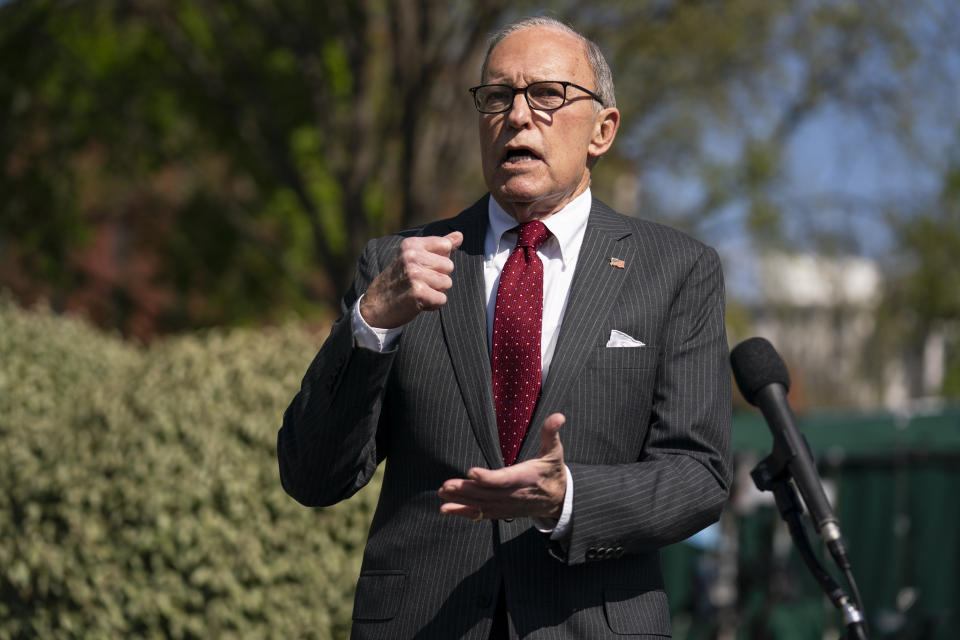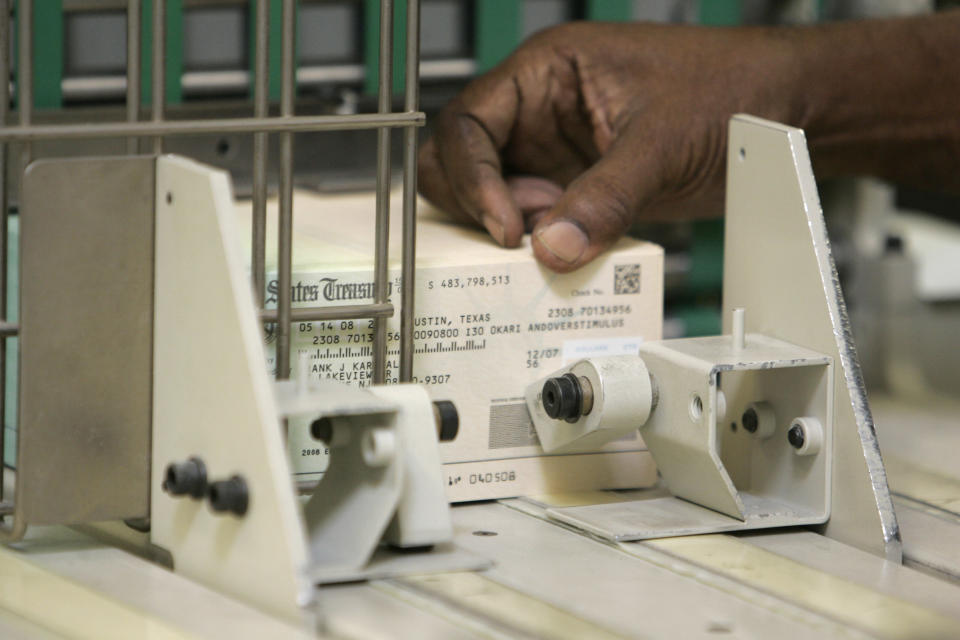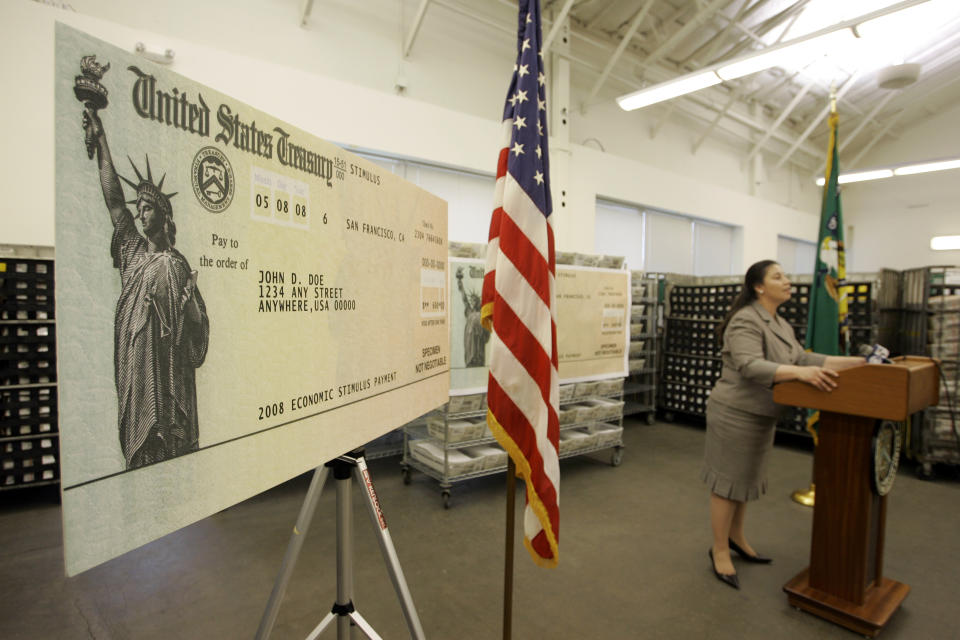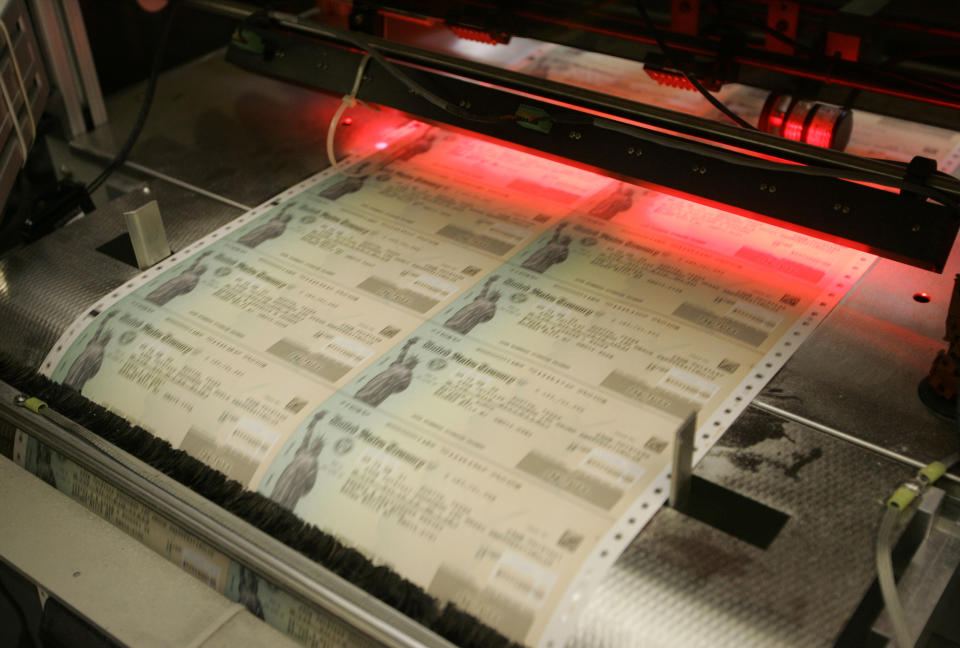Coronavirus stimulus checks: 175 million Americans will start receiving funds 'this week or early next,' Larry Kudlow says
An estimated 175 million Americans will get stimulus checks with the first payments going out this week or next, according to Larry Kudlow, director of the U.S. National Economic Council.
The payments, worth up to $1,200 plus additional $500 per child, are intended to help Americans financially weather job loss, reduced work hours, and other money challenges as large swaths of the country are shut down to curb the coronavirus outbreak.
"The checks from the Treasury and the IRS [will] probably start going out, I think this week, perhaps early next," Kudlow told CNBC.
Kudlow also said glitches that small business have experienced when applying for the relief program will get worked out and told CNBC that the government is supporting the economy by, "liquidity, cash rescue, try to keep the labor force connected to the actual businesses."
While many Americans will start receiving their checks soon, it may take months for others. This depends on what banking information the Internal Revenue Service has on file and other factors. Here's what you need to know about the checks.

When will the stimulus check arrive? It depends.
Treasury Secretary Steven Mnuchin said at a White House briefing last Thursday, that those Americans who have signed up for direct deposit will receive their payment within two weeks.
"Social Security, you'll get it very quickly after that," Mnuchin said. "If we don’t have your information, you'll have a simple web portal, you'll upload it. If we don't have that, we'll send you checks in the mail."
The payments will be deposited directly into your bank account if you received your last tax refund or expect to receive this year's refund that way. You'll also be able to provide your banking details online once a portal is set up, according to the IRS.
Otherwise, checks will be mailed, which could take longer to get to Americans. Adding to the complications, about 6% of U.S. adults — or 12 about 12 million Americans — do not have a checking, savings, or other bank account, according to a 2018 Federal Reserve report.

The New York Times, citing IRS guidelines that detail how Americans who aren't usually required to file tax returns will need to do so to receive payments, noted the guidance "will almost certainly mean longer waits for those who must file new returns to be eligible to receive a stimulus payment."
Americans with the lowest income will get mailed checks first, according to reporting by the Washington Post. Here's the timetable for the first checks, per IRS documents seen by the Post:
Taxpayers with income up to $10,000: April 24
Taxpayers with income up to $20,000: May 1
Taxpayers with income up to $40,000: May 15
The rest of the checks will be issued by gradually increasing income increments each week. Households earning $198,000 who file jointly will get their reduced checks on Sept. 4. The last group of checks will be sent on Sept. 11 to those who don't have tax information on file and had to apply for checks, according to the Washington Post.
Who gets a stimulus check?
Your eligibility is based on your most recent tax return and your adjusted gross income. If you already filed your 2019 taxes, your eligibility will be based on that. If not, the Internal Revenue Service will use your 2018 taxes to determine if you qualify.
Read more: Tax deadline postponed: Why you should still file as soon as you can
The benefit is available not only to those who have filed taxes, but also to those who receive Social Security benefits as long as they’ve received their SSA-1099 or RB-1099 forms.

Single adults with income up to $75,000 will get a $1,200 payment. Married couples with income up to $150,000 will get $2,400. Single parents who file as head of household with income up to $112,500 will get the full $1,200 check.
Additionally, Americans who qualify for the stimulus payment and have children will get an additional $500 per child under 17.
Reduced checks will be available for single adults who earn between $75,001 and $99,000 and married couples who earn between $150,001 and $198,000. The check will be reduced by $5 for every $100 over $75,000 for single adults and $150,000 for married couples.
Who doesn't get a check?
Single adults who make more than $99,000 and married couples who earn more than $198,000 won’t receive stimulus checks.
Those without a Social Security number and nonresident aliens — those who aren't a U.S. citizen or U.S. national and don't have a green card or have not passed the substantial presence test — aren't eligible.
You're also ineligible if your parents claim you as a dependent on their taxes.
How will the government send you the stimulus check?
The IRS will use the direct deposit information you provided from the taxes you've filed either for 2019 or for 2018.
If you have no direct deposit information on file or if the account provided is now closed, the IRS will mail you a check, instead.

If the IRS doesn’t have your direct deposit information
If you didn't include your direct deposit information when filing your taxes or if you receive your Social Security payments by mail, you may be able to do this before checks are sent out.
The Treasury plans to create a web-based portal for individuals to provide their banking details online, according to the IRS. That will help Americans get payments faster rather than waiting for a check in the mail, according to the IRS.
Do you have to pay back the stimulus check?
No. The stimulus payment is actually a refundable credit against your 2020 tax liability, according to Kyle Pomerleau of the American Enterprise, and is paid out as an advanced refund. That means you don't have to wait to file your 2020 taxes to get the money.
It also doesn’t reduce any refund you would otherwise receive, Watson said.
In fact, if you don’t qualify for the stimulus check now based on your 2018 or 2019 tax returns, you may be able to qualify to take the tax credit next year when you file your 2020 taxes if your income meets the thresholds.
Denitsa is a writer for Yahoo Finance and Cashay, a new personal finance website. Follow her on Twitter @denitsa_tsekova.
Read more:
'I may lose everything': Americans reel from job losses as coronavirus stalls economy
'Losing $50,000 a day': This company's workers took voluntary pay cuts to prevent layoffs
Read more personal finance information, news, and tips on Cashay
Follow Yahoo Finance on Twitter, Facebook, Instagram, Flipboard, SmartNews, LinkedIn, YouTube, and Reddit.

 money
money 
